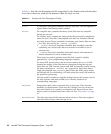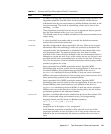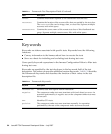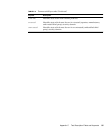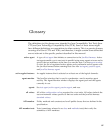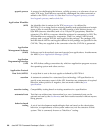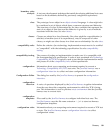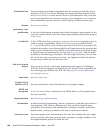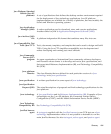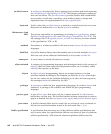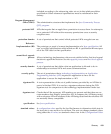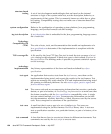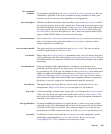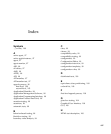
100 Java ME TCK Framework Developer’s Guide • July 2007
distributed tests Tests consisting of multiple components that are running on both the device
and the JavaTest harness host. Dividing test components between the device
and JavaTest harness is often used for tests of communication APIs, tests that
are heavily dependent on external resources, tests designed to run on devices
with constrained resources such as a small display, and data transfer tests.
domain See security domain.
equivalence class
partitioning A test case development technique that entails breaking a large number of test
cases into smaller subsets with each subset representing an equivalent category
of test cases.
exclude list A list of TCK tests that a technology implementation is not required to pass in
order to certify compatibility. The JavaTest harness uses exclude list files
(*.jtx), to filter out of a test run those tests that do not have to be passed. The
exclude list provides a level playing field for all implementors by ensuring that
when a test is determined to be invalid, no implementation is required to pass
it. Exclude lists are maintained by the Maintenance Lead (ML) and are made
available to all technology developers. The ML might add tests to the exclude
list for the test suite as needed at any time. An updated exclude list replaces
any previous exclude lists for that test suite.
first-level appeals
process The process by which a technology implementor can appeal or challenge a
TCK test. First-level appeals are resolved by the Expert Group responsible for
the technology specification and TCK. See also appeals process and second-
level appeals process.
framework See test framework.
Graphical User
Interface (GUI) Provides application control through the use of graphic images.
HTML test
description A test description that is embodied in an HTML table in a file separate from
the test source file.
implementation See technology implementation.
instantiation In object-oriented programming, means to produce a particular object from its
class template. This involves allocation of a data structure with the types
specified by the template, and initialization of instance variables with either
default values or those provided by the class’s constructor function.
interactive tests Tests that require some intervention by the user. For example, the user might
have to provide some data, perform some operation, or judge whether or not
the implementation passed or failed the test.



